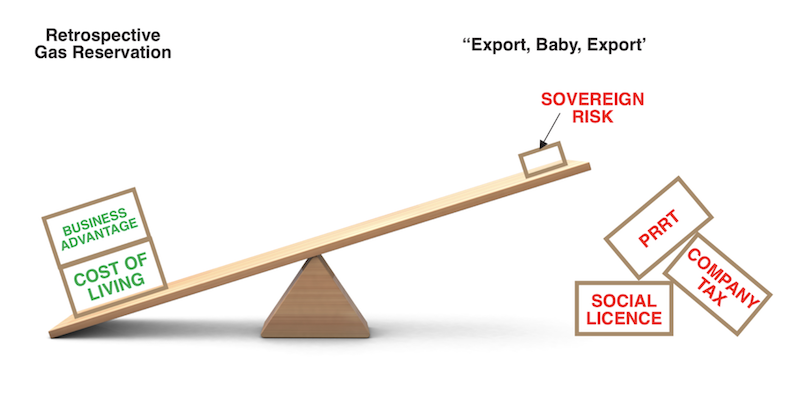The price of electricity in Australia could be halved, but the Government is shying away from giving Australians cost-of-living relief, suckered in by the gas cartel’s lies and spin. Rex Patrick reports on what needs to happen.
In response to mumblings by Government ministers on adopting a gas reservation scheme, the gas cartel’s spin machine has swung into action through right wing media to declare that a prospective gas reservation policy is not a solution to the pending gas ‘valley-of-death’.
The ‘valley-of-death’ comment is a scare tactic, and a flat out lie. There exists an Australian Domestic Gas Security Mechanism (ADGSM) that allows the Government to stop gas exports if there is a shortfall in the domestic market. Exports will stop well before Australians run out of gas.
The second part of the gas lobby’s response – that a prospective gas reservation policy is not a solution – is actually true. Australia needs to have a retrospective gas reservation policy.
Gas Reservation
A gas reservation scheme works by forcing gas production companies to retain a portion of extracted gas for the domestic market. To work well the policy needs to force ample gas into the market to ensure prices are kept low; 15% is the benchmark used in WA.
A prospective gas reservation would not do that. If current gas production were represented as an Olympic size swimming pool, new gas would be a small paddling pool situated near the shallow end – at least for the two decades it would take before there’s enough reserved gas from new wells, by which time Australia will be operating on renewable energy anyway.
Any reservation scheme must be retrospective. But the cartel are well ahead in the lobbying game, so far ahead that Energy Minister Chris Bowen ruled it out on the ABC’s Insiders program before the debate even started.
Sovereign risk furphy
The phrase “sovereign risk” has a number of meanings.
In the financial world ‘sovereign risk’ describes the risk that a country might default on its loan obligations.
In the lexicon of mining and gas executives, ‘sovereign risk’ is a risk they attribute to a country in relation to a government changing policies which may affect their long term profits.
The cartel spin machine rolls out the phrase ‘sovereign risk’ in a loud voice that’s meant to suppress debate; but when you look closely their protestations don’t stand scrutiny.
As a first point, there are many risks that gas companies consider in the context of their proposals. Technical, financial, workforce capability, environmental, changes in relevant legislation (e.g. reservation scheme, tax, red tape requirements) industrial relations, safety, supply chain, … to name but a few.
As a second point, risks are just that – risks. Every investment decision factors in risks. In some countries gas companies don’t factor in the introduction of a reservation policy, because there is already such a policy in place.
The gas cartel must have seen Australia as investment heaven – an attractive investment landscape where they could divert domestic gas to assist in their profitable export business, simultaneously price gouging the locals, while paying little to no company tax nor royalties.
It’s a trap: mooted gas cap plays into the hands of the cartel, locks in high energy prices
Gas heaven v national interest
A dismissal of a retrospective gas reservation scheme solely on the basis of ‘sovereign risk’ is at best hopelessly naïve and in practice a betrayal of the public interest. It’s a cop out designed to avoid a hard decision. Sovereign risk does not engage a principle that is legally binding or immutable.
Sovereign risk is a factor in the national equation. But it’s not the only factor: there are cost of living, competitiveness of industries operating in Australia, jobs within the gas and other sectors, emissions implications, tax revenue and more.
Government must work to ensure there is benefit in their policies for all Australians, and that their policies reflect the value of the majority.
Broken promises
In truth, there is no sovereign risk with a proposal for a retrospective gas reservation policy in Australia.
When the cartel sought approvals to set up the gas export trains in Gladstone, they promised the Australian government that their export operations would not affect domestic gas supply. They lied.
The Second British Invasion: how royal cronies and the gas debacle took Australia for billions
Adjusting policy to compensate for a broken promise involves no sovereign risk at all.
After the Western Australian government bought in a gas reservation scheme in Western Australia, investment in gas production increased,
The gas cartel has already accepted a retrospective gas reservation scheme in Australia. The ADGSM is retrospective – if the gas trigger is pulled it will apply to all producers. They just want that trigger to stay behind the safety glass, locked in a cupboard in the government’s darkest policy basement.
Take a pill Albo
Federal Labor has been returned to government with a super majority. This occurred despite the best efforts of the right-wing media (which happily serve and promote the cartel’s interests) to back the LNP.
For more than a decade gas policy in Australia has failed Australians; both in terms of domestic supply, domestic prices and in terms of the financial benefit. The Australian population get nothing from support of the cartel.
Prime Minister Anthony Albanese should use the comfort of his majority, the decline in influence in the right-wing media and his understanding, expressed through his resources minister last week, that the cartel is operating in this country without social licence to make change.
Changes at the margins won’t cut it. Big changes are essential, and that includes implementing a retrospective gas reservation policy.
Yes, the gas cartel will complain bitterly. But the louder they complain, the more confirmation that the policy change is on track.
Albanese was timid all the way through his first term as Prime Minister. That would need to change. He best take a couple of courage pills before he heads back to the parliament. Maybe then, if he really does take on one of the biggest vested interests that’s got a vice like grip on the future of our country, he’ll be worthy of joining the ranks of other Labor reformers like Chifley, Whitlam, Hawke and Keating.
Climate Betrayal: how backroom deals with Japan locked Australia in for decades of gas
Rex Patrick is a former Senator for South Australia and, earlier, a submariner in the armed forces. Best known as an anti-corruption and transparency crusader, Rex is also known as the "Transparency Warrior."


